
European Journal for Philosophy of Science
Scope & Guideline
Connecting Ideas, Inspiring Innovation in Scientific Philosophy
Introduction
Aims and Scopes
- Philosophical Foundations of Science:
Explores the underlying philosophical principles that inform scientific methods and practices, including discussions on realism, anti-realism, and the nature of scientific theories. - Interdisciplinary Approaches:
Encourages contributions from various fields, emphasizing the importance of interdisciplinary perspectives in understanding scientific phenomena and practices. - Methodological Reflections:
Focuses on the methodologies employed in different scientific disciplines, examining how they shape our understanding of scientific inquiry and knowledge production. - Ethics and Values in Science:
Investigates the role of ethical considerations and value-laden judgments in scientific research, policy-making, and public understanding of science. - Historical and Social Contexts of Science:
Analyzes the historical development of scientific ideas and practices, as well as the social implications and responsibilities of scientific research. - Complexity and Systems Thinking:
Addresses the challenges posed by complex systems in scientific research, promoting discussions on modeling, causation, and the nature of scientific explanations.
Trending and Emerging
- Interdisciplinary Research and Collaboration:
An increase in papers discussing the interplay between different scientific disciplines highlights the importance of collaborative approaches in addressing complex scientific problems. - Ethics and Responsibility in Science:
There is a growing emphasis on the ethical dimensions of scientific practice, particularly regarding issues like climate change, public health, and the social responsibilities of scientists. - Quantum Mechanics and Ontological Debates:
Emerging discussions around quantum mechanics, including interpretations and ontological implications, suggest a renewed interest in the philosophical challenges posed by modern physics. - Modeling and Simulation in Scientific Practice:
The role of modeling and simulation as essential tools in scientific inquiry is gaining traction, with increased attention to their epistemological implications and methodological significance. - Sustainability and Environmental Philosophy:
A trend towards exploring philosophical questions related to sustainability and environmental science reflects the urgency of addressing ecological crises within philosophical discourse.
Declining or Waning
- Reductionism and Simple Models:
There has been a noticeable decrease in papers focusing on reductionist approaches and overly simplistic models of scientific inquiry, as the emphasis shifts towards more complex, holistic understandings. - Traditional Philosophy of Science:
Discussions rooted in classical philosophy of science, such as strict logical positivism or foundationalism, have become less frequent, suggesting a move towards more contemporary and pragmatic approaches. - Static Ontologies:
Themes associated with fixed or static ontologies in science are appearing less often, reflecting a growing interest in dynamic and processual views of scientific entities and phenomena. - Purely Theoretical Constructs:
The focus on abstract theoretical constructs without empirical grounding seems to be waning, as there is a stronger push towards integrating empirical research with philosophical inquiry. - Disciplinary Isolation:
Papers that emphasize the isolation of disciplines in the philosophy of science are becoming less common, indicating a trend towards interdisciplinary and collaborative frameworks.
Similar Journals

Constructivist Foundations
Connecting Ideas, Inspiring Minds: The Constructivist JourneyConstructivist Foundations is a distinguished academic journal dedicated to exploring the intersection of constructivist theories and interdisciplinary applications. Established in 2010 and published by ALEXANDER RIEGLER in Belgium, this journal aims to provide researchers, educators, and professionals with a platform to disseminate innovative ideas about learning, cognition, and scientific philosophy. With a focus on artificial intelligence, cognitive neuroscience, education, and the history and philosophy of science, Constructivist Foundations has made strides in contributing to meaningful discussions within these Q2 and Q3 ranked fields. Although it currently holds a Q4 status in several areas, it plays a crucial role in fostering knowledge and dialogue among scholars, thereby enhancing the understanding of constructivist principles across various domains. With robust academic engagement and open access options, this journal continues to shape the future of educational and cognitive research.
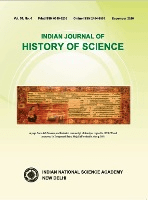
INDIAN JOURNAL OF HISTORY OF SCIENCE
Connecting Past Innovations to Present DiscoveriesINDIAN JOURNAL OF HISTORY OF SCIENCE, published by the Indian National Science Academy, offers a vital platform for researchers, professionals, and students dedicated to the exploration of the historical development of science and technology in India and beyond. With the ISSN 0019-5235 and E-ISSN 2454-9991, this peer-reviewed journal aims to promote interdisciplinary collaboration by publishing original research articles, reviews, and discussion papers that highlight the contributions and evolution of scientific thought throughout history. The journal fosters a unique understanding of how historical contexts have shaped current scientific paradigms, making it an essential resource for academic inquiry. Although it does not currently offer Open Access options, the journal's rigorous editorial standards ensure that it maintains a significant impact within the scholarly community, serving as a crucial reference point for historical scholarship in the sciences. Its address in Bahadur Shah Zafar Marg, New Delhi 110 002, India, situates it within a rich tapestry of cultural and academic heritage, further enhancing its significance in the field.

Epistemology & Philosophy of Science-Epistemologiya i Filosofiya Nauki
Illuminating the Pathways of Philosophical ThoughtEpistemology & Philosophy of Science-Epistemologiya i Filosofiya Nauki is a prestigious journal published by the Russian Academy of Sciences - Institute of Philosophy, dedicated to advancing the discourse in the fields of epistemology, philosophy of science, and related disciplines. With a distinguished presence in academia, this journal is recognized for its exceptional contributions, evident through its categorization as a Q2 journal in Arts and Humanities and Philosophy, and a Q1 journal in Cultural Studies. Covering an expansive scope from 2017 to 2023, it facilitates a vital dialogue among scholars and professionals aiming to explore the intersections of knowledge, culture, and education. Although currently not open access, the rigorous peer-review process ensures that only high-quality research is published, enriching the intellectual landscape. The journal's commendable rankings in Scopus, particularly in Arts and Humanities and History and Philosophy of Science, reflect its commitment to scholarly excellence. For researchers, educators, and students, Epistemology & Philosophy of Science serves as an essential resource for understanding and contributing to the ongoing philosophical dialogues that shape our comprehension of scientific inquiry.
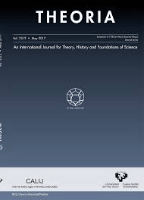
THEORIA-REVISTA DE TEORIA HISTORIA Y FUNDAMENTOS DE LA CIENCIA
Advancing the Dialogue on Science and HistoryTHEORIA-REVISTA DE TEORIA HISTORIA Y FUNDAMENTOS DE LA CIENCIA, published by the Servicio Editorial Universidad del País Vasco, is a leading open access journal dedicated to advancing the fields of History, Philosophy of Science, and related disciplines since its inception in 2003. With a robust impact factor placing it in the esteemed Q1 and Q2 quartiles in its respective categories, this journal serves as a crucial platform for researchers, professionals, and students who are engaged in profound discussions and analyses of scientific foundations and historical contexts. Based in Spain, THEORIA has consistently demonstrated its commitment to scholarly excellence, achieving notable rankings in Scopus, particularly in the fields of Arts and Humanities, where it holds a rank of #169 in Philosophy and #59 in History and Philosophy of Science. The journal not only allows immediate open access to its diverse range of articles, fostering global knowledge dissemination, but also aims to bridge connections across varied philosophical inquiries and historical explorations within science. Join the dialogue today in shaping the future understanding of our scientific heritage.
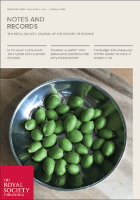
Notes and Records-The Royal Society Journal of the History of Science
Bridging Time: Where History Meets ScienceNotes and Records - The Royal Society Journal of the History of Science is an esteemed scholarly journal published by the Royal Society in the United Kingdom, focusing on the historical aspects of science and its impact on modern scientific practices. With an ISSN of 0035-9149 and E-ISSN 1743-0178, this journal serves as a vital platform for researchers, professionals, and students who seek to explore the intricate connections between historical developments and contemporary scientific discourse. Recognized for its academic rigor, it holds a commendable position in the Q3 category of the History and Philosophy of Science field, ranking #56 out of 223 according to Scopus, and showcasing a 75th percentile ranking. Covering converged years from 1970 to 1973 and from 1975 to 2024, the journal publishes articles that contribute significantly to the understanding of the evolution of scientific thought. While it currently does not operate under an open access model, its esteemed content continues to engage a broad readership, fostering a deeper appreciation for the history behind scientific innovation and inquiry.
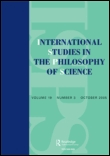
International Studies in the Philosophy of Science
Cultivating critical perspectives on scientific methods and ethics.International Studies in the Philosophy of Science is a distinguished journal published by Routledge Journals, Taylor & Francis Ltd, dedicated to advancing scholarly dialogue in the intersecting realms of philosophy and science. With an ISSN of 0269-8595 and an E-ISSN of 1469-9281, this journal offers a carefully curated collection of research articles, reviews, and discussions that explore critical philosophical questions related to scientific methods, theories, and ethics. Although coverage for the journal in Scopus has been discontinued since 2017, it still maintains a respectable position with a rank of #75 out of 140 in the Arts and Humanities category, showcasing its relevance within the field. While it currently does not offer open access, the journal continues to be an essential resource for researchers, professionals, and students seeking to deepen their understanding of the philosophical underpinnings that inform scientific inquiry. By putting a spotlight on interdisciplinary approaches and fostering robust academic debate, International Studies in the Philosophy of Science plays a vital role in shaping the future discourse in the philosophy of science.
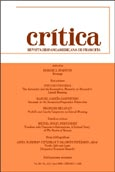
CRITICA-REVISTA HISPANOAMERICANA DE FILOSOFIA
Exploring the Depths of Hispanic PhilosophyCRITICA-REVISTA HISPANOAMERICANA DE FILOSOFIA, published by CRITICA in Mexico, is a prominent peer-reviewed journal established in 1977 that has continually contributed to the field of philosophy in the Hispanic world. With an ISSN of 0011-1503 and an E-ISSN of 1870-4905, this journal plays a significant role in disseminating philosophical discourse, engaging both established and emerging scholars. It holds a Q3 ranking in the field of Philosophy according to the 2023 Category Quartiles and is ranked 305 out of 806 in the Scopus Arts and Humanities: Philosophy category, placing it in the 62nd percentile. Although it does not offer an open access option, its commitment to quality and relevance makes it an essential resource for researchers and students eager to explore contemporary philosophical issues and debates. The journal remains a vital platform for intellectual exchange, encouraging diverse perspectives that enrich the landscape of philosophical inquiry.

Spontaneous Generations-Journal for the History and Philosophy of Science
Exploring the Intersection of Science, History, and PhilosophySpontaneous Generations: Journal for the History and Philosophy of Science is a dedicated publication focusing on the rich fields of history and philosophy within the scientific domain. Published by the Institute for the History and Philosophy of Science and Technology, this journal provides a vital platform for scholars, researchers, and students to explore and disseminate ideas that bridge the historical context and philosophical inquiries of scientific practices. With its commitment to open access, Spontaneous Generations ensures that groundbreaking research is widely available, fostering an environment of collaboration and knowledge sharing. Aiming to engage a diverse audience, this journal is pivotal for those looking to understand the evolution of scientific thought and its implications on contemporary issues, making it an essential resource in the academic community.
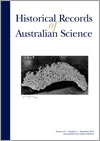
Historical Records of Australian Science
Exploring the Depths of Scientific Heritage.Historical Records of Australian Science is a premier academic journal published by CSIRO PUBLISHING, focusing on the rich legacy and contributions of Australian science from its inception to contemporary advancements. The journal is integral to the Arts and Humanities and Social Sciences fields, operating within a unique niche that fosters interdisciplinary dialogue and research. With its ISSN 0727-3061 and E-ISSN 1448-5508, it encompasses a diverse scope spanning historical analysis, philosophy of science, demography, and human factors. Although it is currently categorized into Q3 and Q4 quartiles across various relevant spheres in 2023, the journal strives for excellence in archiving pivotal scientific milestones as it continues to publish valuable insights, encouraging submissions from scholars globally. Its commitment to enriching scholarly discussion makes it a crucial resource for researchers, professionals, and students keen on exploring the historical narratives that have shaped Australia’s scientific landscape. With a convergence of knowledge from 1980 through to 2024, the Historical Records of Australian Science stands as a vital repository for those delving into Australia’s scientific heritage.

Metode Science Studies Journal
Bridging Disciplines for a Deeper Understanding of ScienceMetode Science Studies Journal, published by UNIV VALENCIA, BOTANICAL GARDEN UV, is an esteemed open-access journal dedicated to advancing scholarly discourse in the fields of history and philosophy of science and multidisciplinary studies. Since its inception in 2013, the journal has positioned itself as a vital resource for researchers, professionals, and students, fostering an environment for innovative research and cross-disciplinary dialogue. Based in the vibrant city of Valencia, Spain, this journal aims to publish high-quality articles that explore the intricate relationships between scientific practices and philosophical inquiries. With a current impact factor demonstrating its relevance in the academic community, the journal is indexed in Scopus, ranking in the 52nd percentile for history and philosophy of science and the 33rd percentile for multidisciplinary studies. Scholars can access a breadth of research outputs that span from 2015 to 2024, thereby contributing significantly to the intellectual landscape of the respective fields.